
Diabetes is a chronic condition that affects millions worldwide, marked by consistently high blood sugar levels due to impaired insulin production or action. While conventional medicine relies heavily on insulin therapy and medications to control diabetes, Ayurveda offers a holistic alternative that focuses on restoring balance within the body. Rooted in ancient Indian medical practices, Ayurveda aims to treat not just the symptoms but the underlying causes of diabetes by emphasising lifestyle adjustments, diet, and the use of specific herbs known for their blood-sugar-lowering properties.
Table of Content:-
Ayurvedic therapies, from herbal supplements to detoxifying practices like Panchakarma, have shown promising results in supporting blood sugar management, especially for those with Type 2 diabetes. For insulin-dependent individuals, Ayurveda may help enhance overall health and potentially reduce the amount of insulin required over time. This approach offers a natural, personalised path to diabetes management, harnessing the healing power of nature to promote a balanced, healthy life.
To understand how to tackle diabetes with Ayurveda, OnlyMyHealth interacted with Dr Swati Darade, Senior Medical Officer, AYUSH. "The use of Ayurveda in Type 2 diabetes, a chronic yet treatable disease, has shown marked improvement in patients," states Dr Darade. Ayurveda does not promote a one-size-fits-all approach but rather tailors treatment to each individual based on their constitution and the nature of their diabetes.
Types of Diabetes in Ayurveda
Dr Darade explains that, broadly, diabetes can be classified into three main types:
- Type 1 Diabetes: Often affecting younger individuals, this form results from the autoimmune destruction of insulin-producing beta cells. Insulin is typically required for survival.
- Type 2 Diabetes: Known as non-insulin-dependent diabetes, it is the most common type, often developing in people over forty, though younger individuals are increasingly affected. Dr Darade emphasises that while insulin is not required initially, long-term neglect can lead to insulin dependency.
- Gestational Diabetes: Occurs during pregnancy and poses health risks to both mother and child, often linked to hormonal changes that impact insulin function.
Ayurvedic Perspective on Diabetes (Prameha)

In Ayurveda, diabetes is referred to as Prameha, a condition influenced by imbalances in the body's doshas (biological energies) and dhatus (tissues). The condition is categorised based on the patient’s constitution:
Sthula Pramehi (Obese patients): In this type, Ayurveda emphasises detoxification (Shodhan Kriya) through Panchakarma therapies tailored to correct specific doshas.
Krusha Pramehi (Lean patients): For this group, the focus is on nourishment and balance (Shamana Chikitsa) using light foods, herbal preparations like Mantha, Kashaya, and Yav Churna.
These treatments help balance the vitiated doshas and restore harmony in the body. The emphasis on individualised treatment aligns with Dr Darade’s philosophy:
“Ayurveda does not recommend only one course of action for their patients of Prameha because each patient comes with different symptoms, diets, lifestyle, medical complications, and support system,” she says.
Ayurvedic Herbs for Blood Sugar Management

For managing blood glucose levels, Ayurveda relies on a wealth of herbs with hypoglycemic properties. Dr Darade lists some commonly used herbs:
- Guduchi (Tinospora cordifolia)
- Bhuiawala (Phyllanthus amarus)
- Fenugreek (Trigonella foenum-graecum)
- Tulasi (Ocimum sanctum)
- Bitter gourd (Momordica charantia)
- Jambhul (Eugenia jambolana)
- Turmeric (Curcuma longa)
- Pomegranate (Punica granatum)
These herbs help stimulate beta cells, aid in insulin regulation, and promote glucose metabolism. "Ayurveda has lots of herbs which stimulate or regenerate beta cells as well as extra pancreatic cells proposed for hypoglycemic action," Dr Darade explains.
Additionally, certain Ayurvedic herbs contain chromium, an essential mineral involved in insulin function. According to Dr Darade, Babbul beej (Acacia arabica) and Karanj beej (Pongamia pinnata) are rich in chromium and assist in maintaining glucose levels by enhancing insulin activity.
Ayurvedic Therapies for Diabetes

Ayurveda includes various external therapies to support blood sugar management. Some effective practices include:
Udvartana (Herbal powder massage) to stimulate circulation and metabolism.
Snehapana (Medicated ghee or oil intake) for nourishing and balancing the doshas.
Swedan (Medicated steam bath) to eliminate toxins.
Vamana and Virechana (Therapeutic emesis and purgation) for deep detoxification.
According to Dr Darade, these therapies can be customised based on the patient’s constitution and condition. For instance, Takra Dhara (buttermilk therapy) is beneficial in Type 2 diabetes for its cooling and grounding effects.
Managing Insulin Dependency with Ayurveda

While Ayurveda can greatly support blood sugar control, insulin-dependent individuals (Type 1 diabetes) may find it challenging to entirely transition away from insulin. However, for Type 2 diabetics, incorporating Ayurvedic treatments alongside lifestyle changes may reduce insulin reliance over time. Dr Darade stresses the importance of close monitoring and a gradual approach:
“Ayurvedic treatments can help manage blood sugar levels effectively, potentially lowering the need for insulin among Type 2 diabetics when supported by proper diet and lifestyle modifications.”
Conclusion
Ayurveda offers a natural, personalised approach to diabetes management, focusing on lifestyle adjustments, diet, and herbal treatments. While those with Type 1 diabetes may still require insulin, Ayurvedic methods can enhance overall health and potentially reduce complications. For Type 2 diabetics, it offers a holistic path to managing blood sugar and even lowering insulin dependence. With the guidance of experts like Dr Darade, Ayurvedic treatment can become a powerful ally in the journey toward balanced health.
Also watch this video
How we keep this article up to date:
We work with experts and keep a close eye on the latest in health and wellness. Whenever there is a new research or helpful information, we update our articles with accurate and useful advice.
Current Version